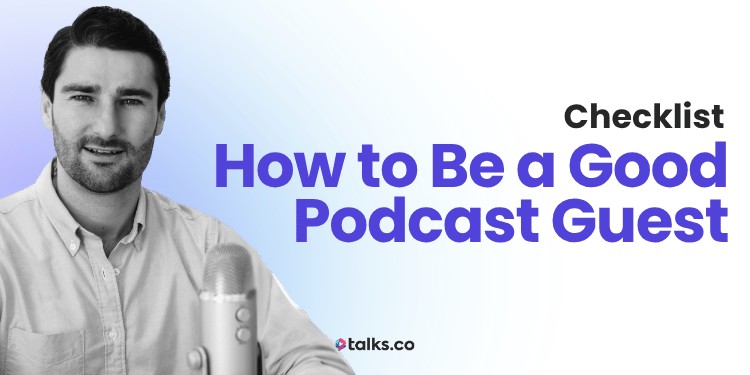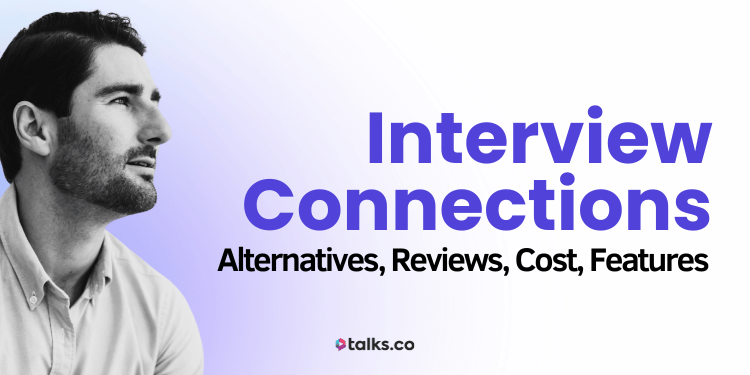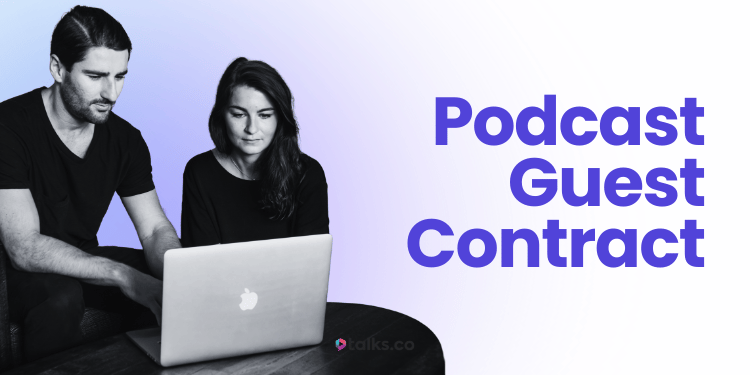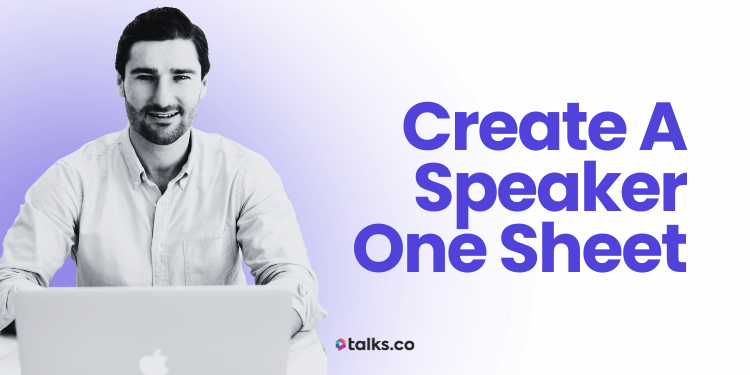You ever finish a podcast interview and think, “Man… I could’ve done that way better”?
Maybe you nailed some answers. Others? Total flops.
Or worse! You blanked on the little things that make an interviewer smirk, podcast audience crank their volume to max, and a podcast episode impossible to ignore.
Here’s the deal: most podcasters treat podcasts like a talking checklist. Facts, stats, generic advice.
Snooze. Forgettable.
And those opportunities? The clients, the credibility, the doors that actually pay when you’re a good guest on a podcast? They slip right past you.
So if you’re stuck doomscrolling Google for tips on how to be a good podcast guest, this guide is your playbook.
After 400+ interviews and coaching hundreds of experts, I’ll show you how to:
- Prep so you actually feel ready
- Speak so people remember you
- Follow up so the impact lasts long after the mic’s off
Stop being just another guest. Start being the one hosts fight over to book.
Tips for Being on a Podcast (Quick Checklist)
This quick checklist helps you show up sharp, stay focused, and make the most of every podcast. Think of it as your high-level guide for before, during, and after being interviewed on a podcast.
Before
☐ Prep your tech and space: Mic, headphones, lighting, quiet room.
☐ Clarify your key messages: 2-3 points that showcase wins and value.
☐ Know the host and podcast’s audience: Match examples and energy to them.
☐ Confirm logistics: Date, time, platform, and pre-brief if possible.
During
☐ Lead with results: Grab attention with real outcomes.
☐ Keep answers concise and story-driven: Context, story, takeaway.
☐ Stay calm and adaptable: Match host’s pace and handle curveballs smoothly.
After
☐ Send a thoughtful thank-you: Highlight something specific from the chat.
☐ Repurpose content: Clips, posts, or newsletter mentions.
☐ Track results and follow up: Celebrate wins and maintain connections.
How to Be a Good Interviewee Before Recording
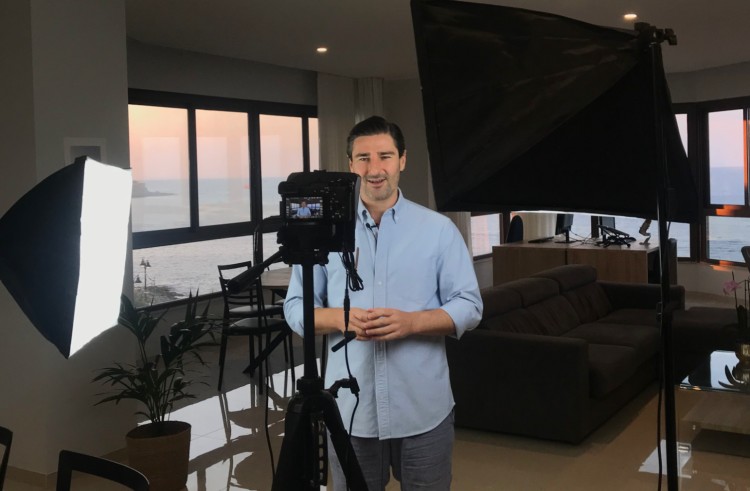
Showing up unprepared is like stepping onto the field without shoes. Prepping before a podcast interview turns off the nerves and makes you memorable and useful to the audience.
Break it down, and it’s way easier to nail every detail.
Tech Prep
☐ Mic and headphones tested: Plug in your Blue Yeti, check for background noise and sound quality, and make sure your earbuds don’t randomly cut out mid-story.
☐ Internet backup ready: Keep a hotspot handy in case your Wi-Fi decides to quit during a story about your business launch.
☐ Room and lighting sorted: Quiet corner, neutral wall, soft light. Bonus points if your cat isn’t walking across the keyboard mid-interview.
Content Prep
☐ Study the host: Listen to a podcast episode or three and see how many listeners a podcast has. Are they rapid-fire like Tim Ferriss or casual and story-driven like Sarah Austin?
☐ Know their audience: Are they coaches, creators, parents, or tech nerds? Tailor examples so they actually care.
☐ Pick 2-3 key messages: For instance, “why I never cold call and still hit six figures,” or “the repeatable method for booking shows.”
☐ Prepare stories and examples: Don’t recite stats when answering questions. Tell mini-stories like how a client hit 3x their email list in 30 days. Quick, relatable, outcome-focused = a great podcast interview.
Logistics and Mindset:
☐ Confirm all the details: Date, time, platform, timezone. Nothing kills a vibe faster than joining at the wrong hour.
☐ Pre-brief with podcast host if possible: Ask about episode focus and do podcast guests get paid on their show. And don’t forget to sign your podcast guest release form.
☐ Wardrobe and energy check: Dress like you’re on stage, hydrate, stretch, and put yourself in a calm but lively headspace.
☐ Backup materials ready: PDFs, screenshots, or quick stats in case you need to support a point mid-chat.
10 Benefits of prepping before a podcast interview
Prepping before a podcast sets you up to show up sharp, memorable, and in control. Lock all of these in and the episode practically runs itself.
- Spot golden opportunities: Identify where to naturally share a client win, like how your coaching program helped Alex hit 5-figure months, without sounding salesy.
- Catch embarrassing slip-ups: Rehearse tricky points, like saying a long URL or complex statistic, to avoid stumbles or “uh-oh” moments.
- Skip boring stats overload: Highlight only numbers that matter, like 25% growth or 3,000 new subscribers, and ditch the rest.
- Match the host’s tone: Jamie likes fast punchy lines, Sara prefers reflective stories. Pep accordingly.
- Find hidden story angles: Prep personal twists, like a client nearly quitting before a breakthrough, to make your points stick.
- Control the conversation flow: Spot when the host drifts off-topic and bring it back with phrases like, “That reminds me of…” or “What I’ve seen work is…”
- Save mental energy on the day: When your anecdotes, stats, and talking points are ready, you can focus on connecting instead of scrambling mid-answer.
- Build quiet confidence: Knowing your anecdotes and stats makes you sound calm and credible.
- Turn details into memorable moments: Prepped touches like a tiny joke, metaphor, or “aha” moment, e.g., comparing a client pivot to a cliff dive, stick with listeners.
- Create follow-up gold: Prep notes become social clips, thank-you emails, and podcast highlights that actually get results.
How to Be a Good Podcast Guest During the Interview
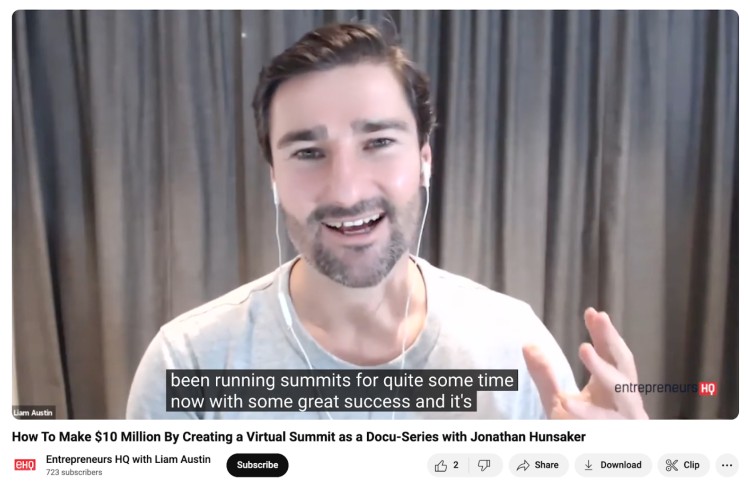
You’re on this podcast for a reason. People want real insight, practical examples, and strategies they can actually use.
These ten steps will help you show up better, share what works, and make your time on air count.
1. Start strong and own the first minute
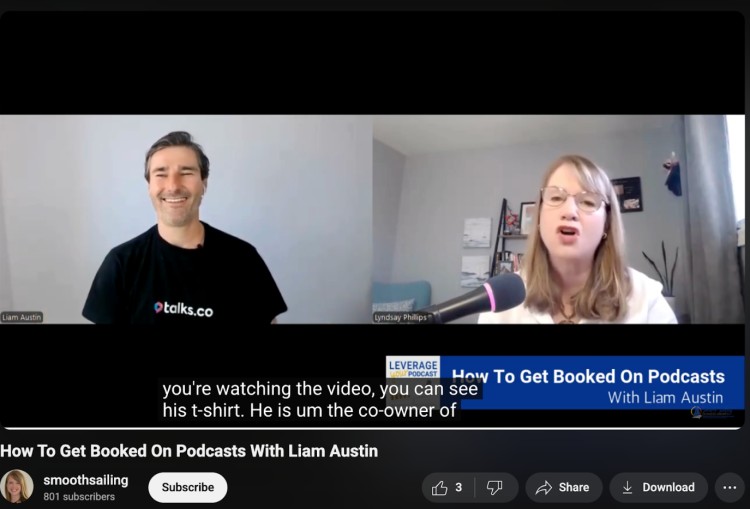
Hosts don’t need the full play-by-play of your life story. They care about why their audience will stop scrolling to listen to you.
- Lead with wins that hit: “I’ve helped 100,000+ entrepreneurs launch and grow online since 2001.” Numbers that make you credible without sounding like a brag.
- Spell out what you actually do: Are you a digital media ninja? A sales growth expert? Say it clearly, in plain English. Don’t hide behind vague titles.
You pop off the page/inbox immediately and the host gets it: you belong on their show, and they’ll want you there yesterday.
2. Match the host’s pace and roll with their rhythm
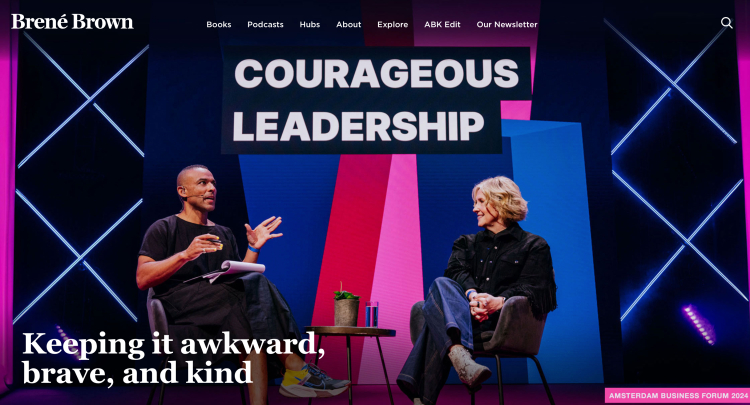
Podcasts are as much about your content as they are about the host’s goals. Play along and make yourself useful.
- Tune into their world: Quick, story-driven answers if they’re snappy. Chill and conversational if that’s their vibe. Match the energy.
- Ask about their big stuff: “What’s your biggest project this year?” This one question gets them talking about what matters. Then figure out how you can help.
- Leave a trail of value: Share the episode, introduce them to other experts, or drop a shoutout on social media. Small moves that make a big impression.
Remember: You’re not “just a guest.” If they remember you, trust you? Suddenly you’re someone they want back all the time.
3. Keep answers tight but punchy
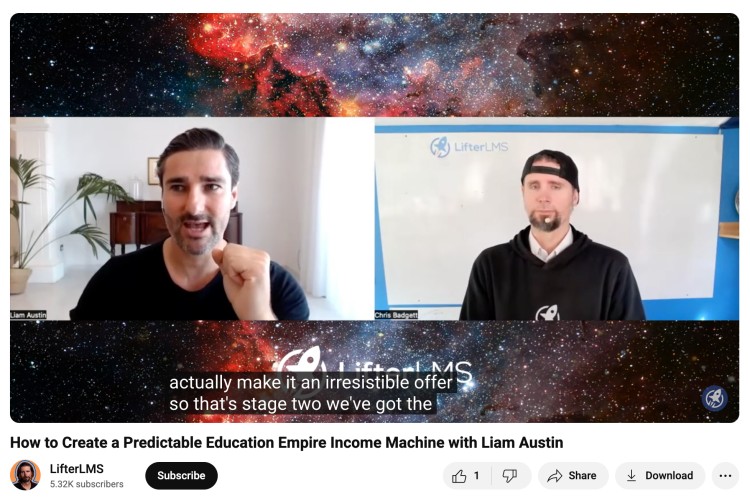
Long-winded answers make listeners zone out. Tight, punchy responses land your points clearly and leave space for follow-ups.
- Use the 3-point rule: Context, story, takeaway. For example, “My client was stuck at $2K months (context), we tested a new offer strategy (story), and they hit $5K months in 60 days (takeaway).”
- Trim fillers: Cut “um,” “like,” and “you know.” Silence is better than padding.
You look sharp, confident, and prepared. Every word counts, and the listeners remember the story, not the rambling.
4. Drop stories that show, not tell
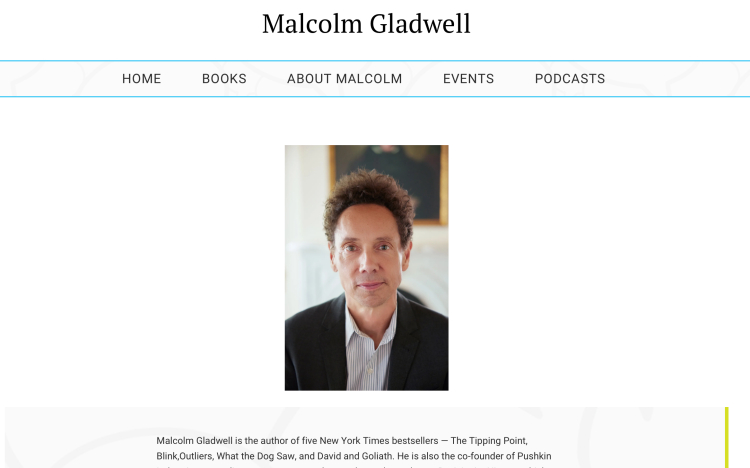
Facts are okay, but stories are what people remember. Don’t just say what you do; show it in action.
- Paint the before: “Sara A. was excited to run her first event, but she wasn’t sure it would make a dent. She had no idea how many clients she could attract or what to charge.”
- Show the transformation: “After running her first session, Sara generated $29,301 and is now working with ideal clients she loves. The fun wasn’t just in the money. It was showing up fully in her business.”
Stories like this make your results tangible. Listeners can picture the journey and the win and that sticks way better than stats alone.
5. Hook listeners early
You’ve got seconds to grab attention before listeners drift. Start with a bold claim, tiny story, or surprising stat that makes them sit up.
- Lead with impact: “Peter Nash was stuck in his consulting business, unsure how to move forward. One tweak to his client offers and tiered products later, he was attracting and signing new clients consistently.”
- Make it visual: “Imagine going from guessing what works to seeing a clear path where clients come to you. That’s exactly what Peter experienced and your listeners want to feel that transformation too.”
When you hook with a tangible win or a real struggle, listeners lean in. You’ve earned their attention in the first 30 seconds, and the rest of your story lands harder.
6. Speak to one person, not the crowd
Podcast listeners feel like you’re talking directly to them when you treat them like an individual, not a room full of strangers.
- Focus your message: “Henri Schauffler wanted multiple high-ticket clients but didn’t know where to start. I talked to him one-on-one and showed him how each step works with checklists.”
- Use relatable specifics: “Instead of saying, ‘Grow your business,’ I shared exactly how Henri could jump-start client acquisition.” One-on-one examples like this make listeners imagine themselves in that situation.
Personalizing your answers makes your advice feel achievable. Listeners think, ‘That could be me,’ and that’s how your message sticks and drives action.
7. Slide your offer in like it belongs naturally
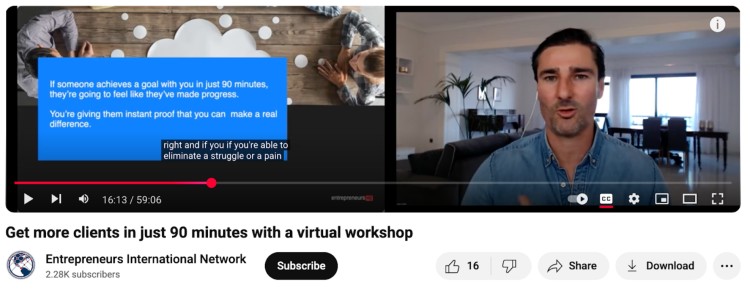
Nobody wants a hard sell mid-interview. Your offer works best when it flows with your story instead of sticking out.
- Weave it into stories: “Michael Morgan, an Alzheimer’s and Longevity Coach, made $40,000 in his first 30 days using this system. I shared his step-by-step process as part of his story, not a pitch.”
- Give context: “Talk about real problems, then hint at your solution. Philip Duncan, an Author’s Coach, booked $10K in high-ticket services the week after using this approach.”
- Why it works: Listeners hear a real transformation, not a sales pitch. Your offer feels natural because it’s part of the story.
8. Stay cool under pressure
Hosts can throw curveballs like questions that catch you off guard, interruptions, or follow-ups that dig deep. Your job? Keep calm, stay composed, and turn it into value.
- Pause, don’t panic: Take a beat before answering. Even a quick, “That’s a great question. Here’s what’s worked for my clients…” keeps you in control.
- Use examples to pivot: Reference real results like Jennifer Gligoric, a Podcast Coach, who went into the new year with a clear plan and confidence after working with us. You can use stories like that to highlight your foolproof strategy under pressure.
- Stay conversational: Keep your tone steady and friendly, even if the host pushes.
Cool confidence makes you sound like the expert you are. Listeners trust someone who handles tough questions without sweating.
9. Know when to stop talking
It’s tempting to over-explain, but long-winded answers lose people. Your goal: make your point, drop the proof, and pause.
- Keep examples tight: Reference outcomes without overloading details. For instance, “Adrian Castro ran his first workshop and now earns $1,500 every month per client. That’s the kind of step-by-step system I share.”
- Pause for effect: Let the story sink in. Silence can make your point stick.
- Leave room for follow-ups: A short, clear answer invites the host to probe deeper, giving you more chances to showcase transformation.
Concise stories hit harder. Listeners remember the results, not the filler.
10. End with a line they’ll remember
Your closing is your signature. Make it punchy, relatable, and tied to impact.
- Tie back to transformation: “I’ve seen clients like Bill Free, a Nonduality Coach, see 10x the success they had before. If you’re ready to do the same, here’s the first step…”
- Use a call-to-imagine: Paint the picture of what’s possible: “Imagine going from a few thousand email subscribers to 100,000 like one of our clients did. What could that look like for your business?”
- Keep it simple: Short, memorable lines stick better than long explanations.
A strong ending leaves the host smiling and listeners thinking about the possibilities. Exactly the impact you want.
7 Podcast Interview Tips to Help You Stand Out
At this level, the basics don’t cut it.
You’re not here to sound smart. You’re here to make people stop scrolling and be remembered as the guest hosts want back again and again.
Here’s how every pro podcaster prepares for a podcast interview:
- Respect airtime: Host asks how you started? Skip your life story and try, “I burned out working 80-hour weeks as a consultant. Now I help executives build freedom businesses in half the time.” Short, punchy, relevant.
- Anchor your energy: Pre-show nerves? Say one win out loud: “I’ve helped 200+ coaches double their client base.” It steadies your voice and focus.
- Play to the audience: If their listeners are new business owners, skip the big words. Say, “Most of my clients start with one workshop a week and get their first $5K client.” Relatable and real.
- Bring a new take, not recycled advice: Ditch recycled advice. Try, “Most coaches undercharge because they price by the hour, not by outcome. One client switched to results pricing and tripled revenue.” Fresh and useful.
- Turn questions into conversation: If the host asks for a top tip, start with, “Funny story. I tested five ad headlines and the one I hated performed best. Here’s what I learned…” Feels human, not rehearsed.
- Let emotion through: Share your first failed launch or first client win. If something genuinely excites or frustrates you, let it show.
- Keep your call-to-action clear: One next step. “If you’re ready to fill your first high-ticket program, grab the free planner on my site.” Smooth, relevant, and easy to follow.
7 Podcast etiquette tips
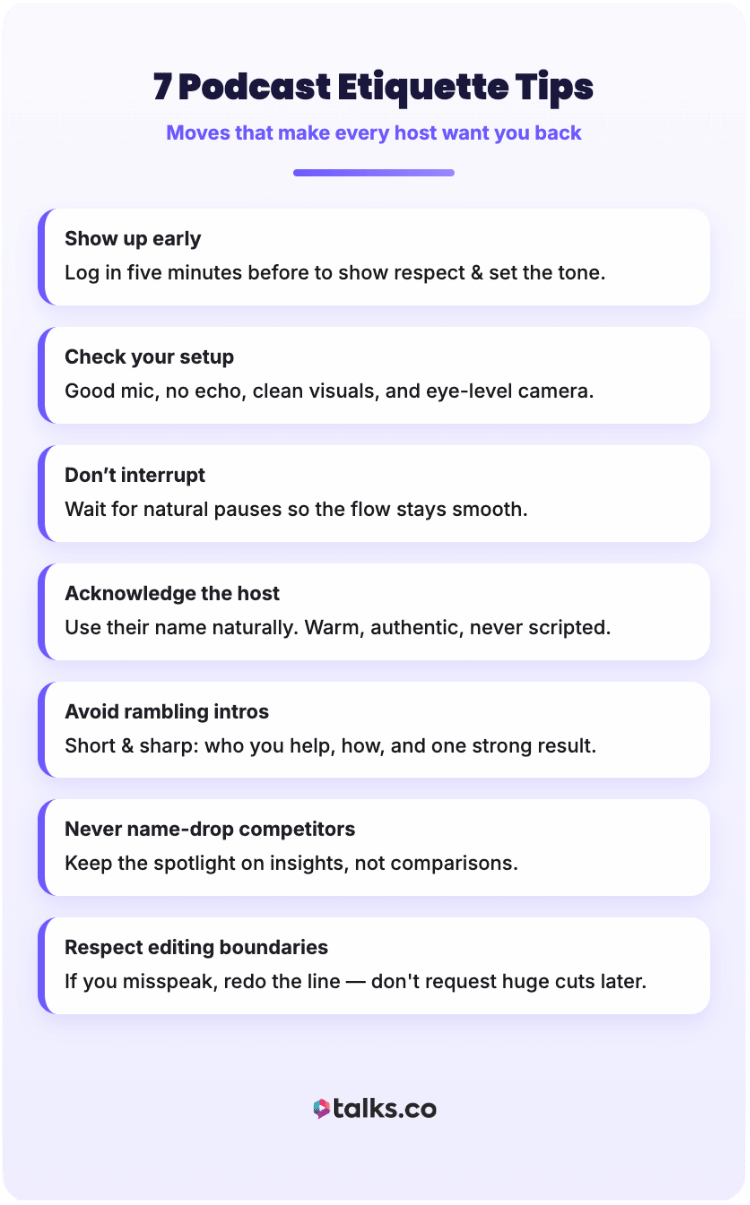
Podcasting is part performance, part relationship building. These quick etiquette moves make you a guest all the best hosts rave about.
- Show up early: Log in five minutes before. It’s a small sign of respect that instantly sets a good tone.
- Check your setup: Good mic, no echo, camera at eye level + clean visuals and audio make you sound credible before you even speak. (Check out the best podcast microphone for your budget here.)
- Don’t interrupt: Even if you’re excited. Wait for the host to pause before jumping in. Smoother conversations make for better listening.
- Acknowledge the host: Use their name naturally and thank them for their questions. A simple “Good point, Alex” feels warm, not scripted.
- Avoid rambling on intros: Keep your intro sharp. Say who you help, how you do it, and one powerful result. Save the long version for later.
- Never name-drop competitors: Keep the focus on your expertise and your audience’s wins, not who you’re “better than.” Insight over ego.
- Respect editing boundaries: If you slip or say something “off-record”, ask to redo the line. Don’t email later to cut whole sections. It makes you look unprepared.
How to Be a Great Podcast Guest After the Interview
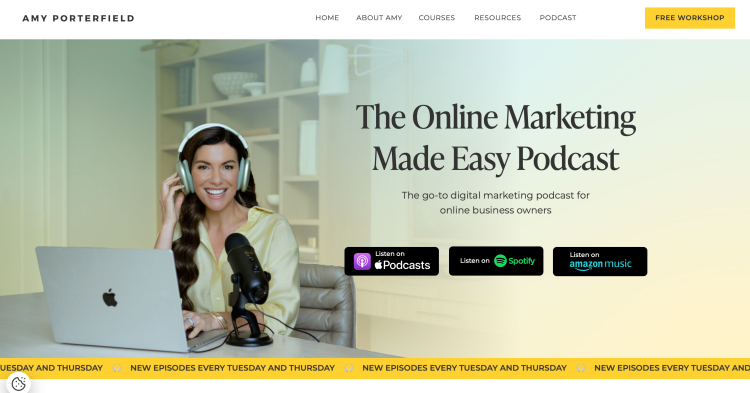
The conversation’s over but your influence isn’t. What you do next makes you memorable, builds authority, and opens doors.
- Show a peek behind the curtain: Share a quick, actionable insight. “I posted the checklist a design coach used to sell her first 8 VIP sessions in 3 weeks.”
- Celebrate small wins: Highlight one tangible result. “After the episode, a fitness client booked 6 coaching calls in 48 hours using the tip I shared.”
- Send a thoughtful note: Reference something unique from the chat. “Loved our talk on client retention! The tweak helped a nutrition coach secure 5 recurring clients.”
- Invite them in: Include hosts in a beta program, workshop, or event. “Gave a host a sneak peek at a new mastermind format. They loved seeing it in action.”
- Keep the story alive: Follow up with results that tie back to the episode. “One client used the email strategy we discussed and added $7K in sales in a week.”
How to promote your podcast guest episode
The episode’s live. Now make it work for you. Share it where your audience actually hangs out, and give them a reason to click play.
- Instagram: Share a 20-second clip where you drop one actionable line like “Here’s how one client signed her first $5K deal without ads.” Tag the host and add “Full episode’s in my bio.”
- LinkedIn: Turn a story from the episode into a short post. “I told this on a podcast last week: how one small pricing shift 3x’d my coaching income.” Tag the host and link in comments.
- TikTok: Record a 30-second “I was just on a podcast” video. Recap the best question the host asked and your key answer. Make it conversational, not scripted.
- YouTube Shorts: Cut a clip where you’re explaining something valuable or reacting naturally. Add subtitles, title it with the takeaway, and link to the full episode in the description.
- Facebook Groups: Share the episode when the topic fits. Let’s say someone’s asking about getting clients, you can reply, “I unpacked this exact thing in my chat on [Podcast name]. Here’s the clip.”
- X (Twitter): Post a short thread that says “Just shared my hot take on [Podcast name] about the 3 mistakes coaches make when pricing their offers.” Give value in the thread, link at the end.
- Pinterest: Create a carousel or quote pin with a line you said, like “Your price signals your confidence.” Add “Full episode with [Podcast name] linked.”
- Email newsletter: Mention your feature as a resource. “I broke down my client enrollment process on [Podcast name]. Here’s the 2-minute version. Full chat’s linked below.”
- Reddit: Post in a relevant subreddit as a tip or story. “I shared on [Podcast name] how a freelancer booked 3 high-ticket clients in a month.” Link it naturally and keep it casual.
- Threads: Post something casual like “This podcast host asked me the best question I’ve had all year. Here’s my answer in 2 lines.” Drop the link in the next post.
How to repurpose your podcast interview for more reach
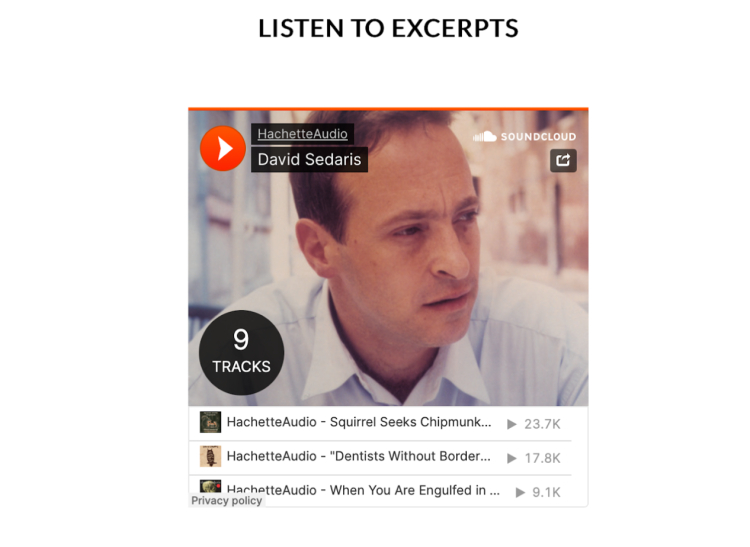
You’ve got gold sitting in that episode. Don’t let it collect digital dust. Stretch it across every platform to fuel weeks of content and turn a single guest appearance into multiple touchpoints.
- Instagram: Slice 15-30 second clips that hit emotion or results. “This one line on pricing mindset? Had 100 coaches DM me within hours.” Pair each clip with a short caption that gives quick context and tags the host.
- LinkedIn: Turn your best quote into a micro-post. “I said this on a podcast and it still rings true: your price signals your confidence.” Add a short takeaway or framework, then link to the full episode in the comments.
- TikTok: Recreate a “reacting to my own advice” video. Film yourself walking through a key framework or answering a question from the episode in 30-45 seconds. Keep it casual and energetic.
- YouTube: Combine podcast clips with simple captions and B-roll to make bite-sized tutorials. “Here’s the 2-minute strategy I mentioned that landed a client her first corporate deal.”
- Facebook Groups: Use a tip as a discussion starter. Post, “We talked about client follow-up systems on [Podcast name]. What worked best for your business?” Then link to the episode for more context.
- X (Twitter): Thread it out. Share the 3 best takes from your chat, e.g., “#1: Stop selling one-on-one if you want to scale.” Keep it punchy, human, and opinionated.
- Pinterest: Post carousels or infographics with short quotes or step-by-step visuals. “5 Steps to Prep for Your High-Ticket Workshop” all pulled from your episode takeaways.
- Substack or newsletter: Write a recap titled 3 Lessons from My Latest Podcast Interview. Add a paragraph on what you shared and turn it into a mini-action guide for subscribers, like a worksheet or checklist they can use immediately.
- Reddit: Share one teaching point in a relevant subreddit like “Here’s my exact process for structuring client strategy sessions,” and invite others to share feedback.
- Threads: Pull a quote, insight, or counterintuitive idea from the episode. Add a mini-tip or micro-framework in the next post so it teaches and hooks readers.
Podcast Guest Tips to Get Booked On More Shows
Easiest way to be a guest on more podcasts? A strong Talks creator profile.
Talks is the fastest way to get booked on podcasts and makes saying yes effortless. Here’s the cheatsheet to optimize your Talks creator profile:
- Lead with wins: Highlight results that matter: “400+ speaker collaborations,” “100K+ leads through virtual events,” “300K+ member business community.”
- Clarify your niche: Be specific: “Virtual Summit Strategist, Podcast Guest Booking Coach, Online Business Growth Specialist.”
- Show recent appearances: List podcasts and media spots like Smart Podcast Guesting, Sell On Social, Mindful Millionaire.
- Highlight podcast guesting availability: Make scheduling easy: “Monday-Thursday, HD video/audio, remote-ready.”
- Offer episode angles: Give hosts concrete ideas: “How virtual summits generate 100K+ leads” or “Automating workshops that convert high-ticket clients.”
- Include media assets: Upload headshots, speaker one-sheet examples, and past clips to build credibility instantly.
- Use automation tools: Auto-match and auto-message hosts in your niche. Less searching, more booked spots.
- Reference real client wins: “One client ran a 90-minute workshop and earned $29K in 7 days using my system.”
- Keep your pitch tight: Two lines: episode idea + one specific takeaway. “How AI-driven virtual summits generate leads. Your listeners get a step-by-step plan.”
- Stay active: Refresh wins, update bio, and respond to matches weekly to stay top-of-mind with hosts.
“Booked Through 2027, But I’ll Pencil You In”
Tired of jumping on podcasts and feeling like you just shouted into the void?
You’ve got the wins, the stories, the expertise. So why does it feel impossible to get them in front of the right people even though you know how to be a good podcast guest?
That’s exactly why Talks.co exists.
Build your free speaker profile, drop in your results, topics, and availability, and instantly match with hosts who actually matter.
You can say goodbye to all the awkward email tennis and no more who’s worth your time.
Just real shows, real top-quality connections, and real opportunities waiting for you.
Claim your FREE Talks profile and start showing up where it counts.
